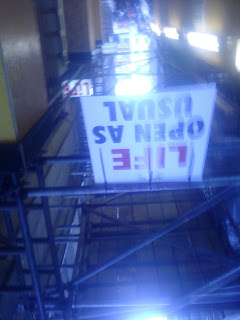This interesting question apparently was scribbled on a submission note to the editor of The Rialto, Micheal Mackmin, in response to Nathan Hamilton's selection of around 50 young poets, all under 35, published in the last three issues. It brings up interesting questions about 'finish' in poetry.
In his second editorial for his selection, Mr Hamilton notes that there is a distinction between a poetry of 'product' and a poetry of 'process.' Product oriented poetry emphasises 'the relability of language in emulating or capturing, and then presenting, an external reality.' Process oriented poetry, on the other hand, is concerned with a way 'of speaking about the world that simultaneously presents the difficulties of doing so.'
One can see this in the choice of poems in the two issues: it swings from the juxtapositions, opaque language and verbal play of Keston Sutherland and Marcus Slease to the little slice of socially-engaged remembrance of Tom Warner. This could be described as a struggle between non-mainstream and mainstream; but I think it's more interesting than that over-simplistic binary suggests. Many of the poets in all three selections (the last ten are in the latest issue, 71) are actually better described as existing on a plain somewhere between the two.
But back to 'finish': and the question we started with. Suppose one were to put a landscape from the 18th century and a landscape by Cezanne, say, next to one another. Which one is more 'finished'? The 18th century landscape has an overall, smooth, finish: and the Cezanne looks more rough, more, dare I say it, 'unfinished.' In the earlier painting, the difficulties of seeing have been smoothed over beneath layer after layer of paint, until we get to something that looks like a landscape. Sure, it's constructed: that landscape, should you find it, wouldn't look exactly like how it does in the picture. But we 'know' what it's about; it's recognisably part of the world we live in.
The Cezanne, however, is more fragmented, more unfamiliar; we can recognise it's a landscape, but he's also incorporated an awareness of the difficulties of seeing that landscape. It looks incomplete, because we are being asked to complete the picture, to see it as if for the first time, in a new way.
That, I think, is something to do with the difference between 'product' and 'process' in contemporary poetry. Poems of 'process' may go through as many drafts as the average mainstream poem; but they don't serve to make the poem 'clearer', or to 'finish' the poem; they aim instead to emphasise that difficulty of seeing. Cezanne led on to Cubism, an even more disorienting way of seeing the world. To me, that's the way of the world: it's in constant flux, it's never finished, it never completes itself. It just carries on changing, moment by moment, and we, and our ways of seeing, are part of that flux.
I have to confess that I have enjoyed this series, and I congratulate the editor of The Rialto for his courage in encouraging this. What is also encouraging is that there are so many young poets who are engaged in these new ways of writing; not always at the far edge of it, but sometimes, as in the poems of Luke Kennard and Helen Phillipson (and the strange not-quite-hanging-togetherness of Emily Berry's poem in this issue) in the middle of this. They are, I think, less concerned with the old dividing line of mainstream vs. non-mainstream. And that, to my mind, is a good thing.
Playboy of the Western Hemisphere
3 weeks ago


4 comments:
Were these young poets quite old by the time Rialto let them know their work was accepted? The mag seems to specialise in loooong delays.
Dunno, but what did you think of what the blog says, Angela?
Nice response piece, Steven. Andrew Bailey just pointed me this way. Thanks very much, I'm very glad you enjoyed it.
This is a very interesting and compelling way of opening up the field Steven :-) I think you are right on with process versus product here. And mainstream vs. non-mainstream . . . ah what a can of worms that is :-) Sometimes mere marketing or packaging. Not that packages don't have a place. But ah . . . when those positions become entrenched we get all sorts of in-breeding, stale water etc. It's time to expand right?
There is a lot of interesting writing exploding in the U.K. We need more editorial vision like Rialto. And more small presses!!! And more reporting on blogs like this one!!!
Hurrah!!
Post a Comment